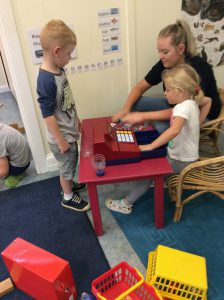Blayney Early Learners is based in a town of 3,500 people in Central West NSW.
CELA writer, Margaret Paton, spoke to Director Georgie Hobby at a time when the service is updating its philosophy and preparing to engage in an international research program – exciting times that will resonate with many educators and directors no matter where they live.
Practice, reflect, improve
Blayney Early Learners is sharing its story at a time when it is also updating its philosophy, to support play and interest based learning.
Hobby says: “We value art and creativity. We allow the children to explore, discover and experiment at their pace. With the supported of our passionate educators, we believe we cater for different learning styles and focus on programming for individual needs. We really value our relationships with our families.”
She had been working casually at the service while studying towards her bachelor’s degree. As a graduate, she worked there full-time and was appointed director late last year at age 24. Hobby now manages 12 staff, all of whom have childcare qualifications including degrees, diplomas or certificates.
Being based in regional Australia has influenced their programming. They enter the local annual agricultural show and explore farming in a practical way, too. Last year the children who live on farms were “very excited” their sheep were lambing, so a lamb was brought into the service all day. And, yes, it did bleat constantly, says Hobby.
“Because we’re such a small community, we have such a tight connection within our families. A lot of us know each other outside of here which helps us to develop the relationships beyond the service’s doors.”
Bang on with community connections
One of the locals, Ben Emms, competed in the shooting event for the recent Commonwealth Games. So, Blayney Early Learners celebrated that with a poster, printed off photos of the races the children watched on TV and did a medal tally.
“We added this to our ‘munch and move’, our fundamental movement, physical and healthy eating program. We’ve been encouraging the kids to gallop, side step, run, and skip and highlighted the different activities they saw in the games.”
The children take a bus regularly to visit the local aged care hostel and one in a nearby village, Carcoar.
“Over time, they’ve become more interested in having conversations with the residents. Those constant visits and range of different activities including performances plus enjoying lunch or morning with the residents makes it more meaningful for both children and residents,” says Hobby.
“We’ve also been connecting with the local schools including primary and high schools. It’s helping the children develop relationships there and we’re seeing the impact it’s having on them.”
Tapping into a world-first study
 Play based learning
Play based learning
The service participated in the Fostering Effective Early Learning Study, conducted by University of Wollongong Researchers in 2015-2016. It looked at how educators’ professional development impact children’s cognitive, social and self-regulatory development. According to the university, the study is a world-first.“The study gave us some really great resources in effective strategies to implement more into our program. We have incorporated a lot of the study including environmental rating scales and some shared thinking scales,” she says.
The scales show different examples of best practice for literacy, maths, science, environmental diversity and self-regulation. It means the service has been able to “set up our environment to reflect these things in a play-based setting”, Hobby says.
“It has helped us develop our relationship with the children and spend more quality time with kids as we help them develop their self-regulation skills and scaffolding them to resolve conflict.
“A focus of the study is literacy – the environmental print. So within our room, although the kids can’t read it, we expose them to more print. We have labelled our different areas. A few weeks ago we set up a ‘fish shop’. Rather just feature images of fish, we had names of fish and their prices. It’s so much more than just sitting and writing.”
The study will aim to understand How professional development can “promote transformational professional learning for early years educators”.
Links:
Fostering Effective Early Learning Study, https://education.nsw.gov.au/media/ecec/pdf-documents/FEEL-Study-Literature-Review-Final.pdf
Note: BEL exceeds the National Quality Standards for children’s educational program and its relationships with families and community. That rating came through in 2013, while Robin Meiklejohn was in the role – she’s still a co-owner of the service.
About CELA
Community Early Learning Australia is a not for profit organisation with a focus on amplifying the value of early learning for every child across Australia - representing our members and uniting our sector as a force for quality education and care.